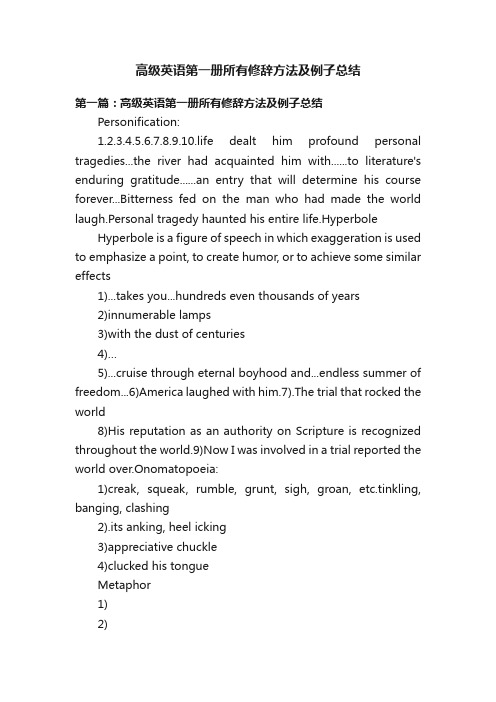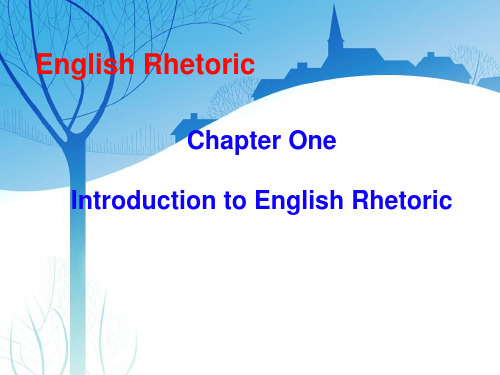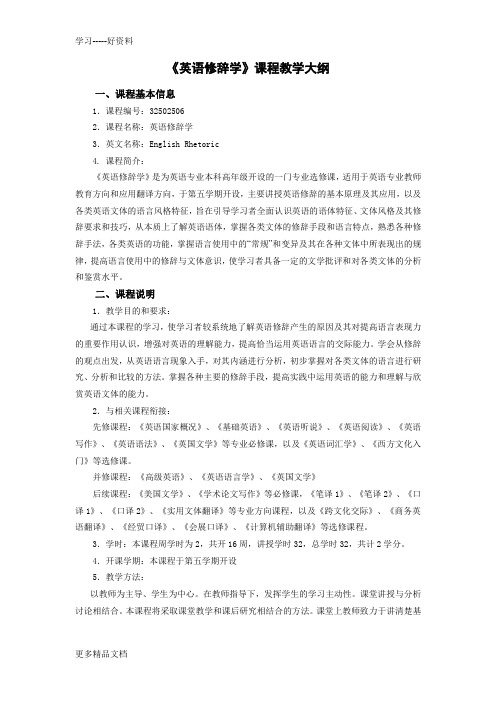《英语修辞学》第四章
英语修辞学例子资料

英语修辞学例子资料高考复习(精品):英语修辞和英语修辞学例子修辞格(Figures of Speech)英语修辞学分为广义修辞学(Broad Stylistic Context)和狭义修辞学。
广义修辞学涉及语体和体裁(Style and Type of Writing)等问题。
狭义修辞学(Narrow Stylistic Context)主要涉及各种修辞手法,即修辞格(Stylistic Devices, Rhetorical Devices or Figures of Speech)的问题。
英语常用修辞格分为词义上的修辞格(Lexical Stylistic Devices)、句子结构上的修辞格(Syntactic Stylistic Devices)和音韵上的修辞格(Phonetic Stylistic Devices)三大类。
(红色为10级讲过)一、Simile(明喻)Simile一词源于拉丁语Similis,意为like。
它根据人们的联想,利用不同事物之间的相似点,借助比喻词(如like,as等)起连接作用,清楚地说明甲事物在某方面像乙事物。
Simile的运用非常广泛,它可借以状物、写景、抒情、喻理,使表达生动形象,明白易懂。
(一)Simile的构成Simile通常由三部分构成:本体(tenor or subject)、喻体(vehicle or reference)和比喻词(comparative word)。
如:My love is like a red red rose.tenor comparative word vehicle注:本体和喻体一般为两个不同类的事物,比喻方可成立。
例如:①John is as tall as his father. [Comparative sentence]②John is as tall as a Maypole (五月柱). [Simile]例①不算明喻,只是一个比较句,因为John 和his father同类,例②是明喻,因为本体和喻体不同类。
高级英语第一册所有修辞方法及例子总结

高级英语第一册所有修辞方法及例子总结第一篇:高级英语第一册所有修辞方法及例子总结Personification:1.2.3.4.5.6.7.8.9.10.life dealt him profound personal tragedies...the river had acquainted him with......to literature's enduring gratitude......an entry that will determine his course forever...Bitterness fed on the man who had made the world laugh.Personal tragedy haunted his entire life.Hyperbole Hyperbole is a figure of speech in which exaggeration is used to emphasize a point, to create humor, or to achieve some similar effects1)...takes you...hundreds even thousands of years2)innumerable lamps3)with the dust of centuries4)…5)...cruise through eternal boyhood and...endless summer of freedom...6)America laughed with him.7).The trial that rocked the world8)His reputation as an authority on Scripture is recognized throughout the world.9)Now I was involved in a trial reported the world over.Onomatopoeia:1)creak, squeak, rumble, grunt, sigh, groan, etc.tinkling, banging, clashing2).its anking, heel icking3)appreciative chuckle4)clucked his tongueMetaphor1)2)3)4)5)I had a lump in my throat At last this intermezzo came to an end...I was again crushed by the thought..hen the meaning...sank in, jolting me outof my sad reverie little old Japan adrift amid beige concrete skyscrapers...struggle between kimono and the miniskirtlittle old Japan----traditional floating houses6)I thought that Hiroshima still felt the impactHiroshima----people of Hiroshima, especially those who suffered from the A-bomb(keep her thoughts under control)E.g.1)Whether for him, the arch 3)The Nazi regime is devoid of all theme and principle except and racial domination.a.his wife shot him a swift, warning glance.(give sb.an angry and quick glare)b.The words spat forth with sudden savagery.(the detective said the words suddenly and savagely.)c.Her tone...withered...(become shorter from her frightening voice)d....self-assurance...flickered...(hesitate;move with a quick wavering light emotion)e.The Duchess kept firm tight rein on her racing mind.1)f.Her voice was a whiplash.i.(a heavy blow)2)g.eyes bored into himi.(look at him pointedly or sharply)3)h.I’ll spell it out.a)(explain or speak outfrankly and in detail)4)1.Mark Twain---Mirror of America5)2.Most Americans remember Mark Twain as the father of Huck Finn's idyllic cruisethrough eternal boyhood and Tom Sawyer's endless summer of freedom and adventure.6)3.The geographic core, in Twain's early years was the great valley of the MississippiRiver , main artery of transportation in the young nation's heart.7)4.The cast of characters set before him in his new profession was rich and varied — acosmos.8)Cast of characters: people of various sorts;cosmos: a place where one can find all sortsof characters9)5.Steamboat decks teemed not only with the main current of pioneering humanity, butits flotsam of hustlers, gamblers, and thugs as will.10)current: stream, here not a good choice for the verb teem.11)6.He went west by stagecoach and succumbed to the epidemic of gold and silver fever inNevada 's Washoe region.12)Succumbed…to: gave way to(yielded to, submitted to)the gold and silver rushprevailing in that area.13)7.For eight months he flirted with the colossal wealth available to the lucky and thepersistent, and was rebuffed.Flirted…wealth: did not try hard or persistently enough to get the colossal wealth…14)15)16)17)18)19)20)21)22)23)24)25)26)27)28)29)30)31)32)33)34)failed 8.From the discouragement of his mining failures, Mark Twain began digging his way to regional fame as a newspaper reporter and humorist.6.He went west by stagecoach and succumbed to the epidemic of gold and silver fever in Nevada 's Washoe region.Succumbed…to: gave way to(yielded to, submitted to)the gold and silver rush prevailing in that area.7.For eight months he flirted with the colossal wealth available to the lucky and the persistent, and was rebuffed.Flirted…wealth: did not try hard or persistently enough to get the colossal wealth…failed Digging …fame: working hard to gain regional fameMark Twain honed and experimented with his new writing muscles.Honed: sharpened/exercised.It is not suitable to say “sharpen one's muscles”.saw clearly ahead a black wall of night...the vast basin drained three-quarters of the settled United StatesAll would resurface in his books...that he soaked up...(submarine comes back to the surface, here reappear)When railroads began drying up the demand......took unholy verbal shots...my case would snowball into...our town...had taken on a circus atmosphere.The street...sprouted with...He thundered inhis sonorous organ tones.… had not scorched the infidels...…after the preliminary sparring over legalities…The case had erupted on my head.Now Darrow sprang his trump card by calling Bryan as a …But although Malone had won the oratorical duel with Bryan.Then the court broke into a storm of applause that …He accused Bryan of calling for a duel to the death …Irony: a figure of speech in which the meaning literally expressed is the opposite of the meaning intended and which aims at ridicule, humor or sarcasm.1)Hiroshima---the Liveliest City in Japan2)marching backwards to the glorious age of the 16th centuryAnti-climax : the sudden appearance of an absurd or trivial idea following a serious significant ideas and suspensions.This device is usu.aimed at creating comic or humorous effects.1)a town known throughout the world for its---oystersParallelismthe repetition of sounds, meanings and structures serve to order, emphasize, and point out relationsϒϒϒϒ(1)The past, with its crimes, its follies, and its tragedies...(2)the return of the bread-winner, of their champion, of their protector(3)We shall fight him by land, we shall fight him by sea, we shall fight him in the air.(4)are still primordial human joys, where maidens laugh and children play.ϒ(5)Let us...Let us...ϒ(6)He hopes...He hopes(7)Behind all this glare, behind all this stormLitotes(double negative)(语轻意重法,间接肯定法)a)A negative before another word to indicate a strong affirmative in the oppositedirection.b).Sarcasm1)ah, yes, for there are times when all pray2)There is some doubt about that.3)His reputation as an authority on Scripture is recognized throughout theworld.Alliteration(头韵)repetition of vowel sound1)2)3)4)its anking, heel ickingRhetorical question1)E.g.… but can you doubt what our policy will be?Assonance e.g.when bigots lighted faggots to burn...Repetition –Antithesis(两个结构相似但是意思相反的平行从句便是对偶句)1)E.g.Anyman or state who fights on against Nazidom will have our aid.Any man or state who marches with Hitler is our foe.(E.g.The coward does it with a kiss, the brave man a sword.)2)From them all Mark Twain gained a keen perception of the human race, of the difference between what people claim to be and what they really are.3)...took unholy verbal shots at the Holy Land...4)...a world which will lament them a day and forget them foreverSimilea)b)c)d)e)I see also the dull, drilled, docile, brutish masses of the Hun soldiery plodding...a memory that seemed phonographic...swept the arena like a prairie fire...a palm fan like a sword...The oratorical storm … blew up in the little court in Dayton swept like a freshwind …Periodic sentence(圆周句)Periodic sentences achieve forcefulness by suspense.The essential elements in the sentence are withheld until the end.松散句把主要意思放在次要意思之前,先说最重要的事情,因而读者在看到最初的几个词后就知道这句话的意思。
修订版《语言学纲要》第四章 语 法

第四章语法一、举例解释下列名词内部曲折——是通过改变词中语素的部分元音或辅音来表示语法意义的一种方式,又称语音交替或音位交替。
如英语的所谓不规则动词,大多是用语音交替来表示形态变化。
格——表示名词、代词在句中同其他词的关系,它的意义是直接和句法相关的。
性——通过词(名词、代词等)的形态变化表现事物的性别特征。
欧洲的许多语言中都有。
屈折词缀——黏附在词的后面,只改变一个词的形式,不构成新词的词缀。
黏着语素——不能够独立成词的语素叫黏着语素。
体——体(aspect)表示动作行为的各种阶段和状态,是动词特有的语法范畴。
最常见的是完成体和未完成体(或持续体、进行体),此外还有起始体、继续体、中断体、反复体、短时体(或瞬间体)等等。
时——时是动词的语法范畴,时(tense)表示动作行为发生的时间。
这时间往往以说话的时间为准,分为现在、过去、未来。
词法——语素组合在词的规则和词的变化规则合称词法。
二、填空1、和动词有关的语法范畴有时、体、(态)和(式)。
2、由两个或两个以上的语素构成的词叫做(合成词)。
3、在workers中,worker这一部分可以称为(词干)。
4、按照词法结构类型,语言可以分为(词根语)、(黏着语)、(屈折语)和(复综语)。
5、句子的最大特点是(有语调)。
6、仅有一个语素构成的词是(单纯词)。
7、最小的语法单位是(语素)。
8、和名词有关的语法范畴有性、格、(数)。
9.词的组合有五种基本类型,例如“研究问题”属于(支配式),“跑的很快”属于(补充式),“马上出发”属于(偏正式),“火山爆发”属于(主谓式)。
10、能够改变词类的是(构词)词缀。
11、表达语法意义的语法形式除了有类的配列之外,还有(形态的一致性配合)和(虚词)。
三、单项选择1、下列各组词中全部属于复合词的一组是(D )A.大学、人民、(英)reader B.劳动、阿姨、(英)railwayC.瓶子、教室、(英)unhappy D.道路、材料、(英)classroom2、与“春光明媚”结构相同的组合是(A )A.阳光充足 B.已经开始C.调查研究 D.工人和农民3、以下关于句法变换陈述正确的一项是( B )A.句法变换反映的是句子之间的关系B.句法变换可以区分句法多义C.容许变换说明一个语言的语序是自由的D.变换从不改变句子的语义4、区分词类最重要的依据是(C)A.意义 B、形态变化 C、句法功能 D、语言的类型特点5、现代汉语普通话中的“花儿”是()A .单纯词B .派生词 C.复合词 D.语素6、分析以下Michoacan Aztec语中的一些词以及英语翻译。
《英语修辞学》第一章

Ⅰ About the Course
➢ 1. Optional course of English Major ➢ 2. Learners: Seniors of English Major ➢ 3. Main content:
General idea about English rhetoric a brief and interesting survey of the history of rhetoric with emphasis on several major classical rhetoricians and their theories and application
Page 4
Ⅱ Definition of Rhetoric ➢ Whoever does not study rhetoric will become a victim
of it. ---Ancient Greek wall inscription
➢ Histories make men wise; poets, witty; the mathematics, subtle; natural philosophy, deep, moral, grave; logic and rhetoric, able to contend. ---Francis Bacon
assignments
➢5. Text Book
胡曙中:《现代英语修辞学》,上海外语教育出版社,2011年9月第1版
➢6. Reference Books
黄 任:《英语修辞与写作》,上海外语教育出版社,1999. 张秀国:《英语修辞学》,清华大学出版社、北京交通大
学出版社,2005 李鑫华:《英语修辞格详论》,上海外语教育出版社,2000
第四章 修辞1概论和词语修辞

• 质胜文则野,文胜质则史。文质彬彬, 然后君子。(《论语·雍也》)
• 不知命,无以为君子也;不知礼,无 以立也;不知言,无以知人也。 (《论语·尧曰》)
• 不学《诗》,无以言。(《论语·卫灵 公》)
• 志有之,言以足志,文以足言。不言, 谁知其志?言之无文,行而不远。 (《左传·襄公二十五年》)
• 你老板的词汇量比你的大。这是他成为你老 板的原因之一。(Your boss has a bigger vocabulary than you have. That’s one good reason why he’s your boss.)
• 你的词汇就是你的个性。(Your words are your personality.)
第一节 修辞概说
• 教学目的——一些基本问题: • 修辞渗透于语言和思想; • 修辞的性质; • 修辞同语境的密切关系; • 修辞在社会生活中的重要作用; • 修辞的学习方法; • 修辞主体的修养。
一、修辞渗透于语言和思想
• 1、修辞的源流 • 2、修辞的“一般性可能机率原理” • 3、修辞与人类的一般思维方式 • 4、修辞的形式本身也能涵蕴价值观念 • 5、修辞是一种人生态度 ,展示心理 • 6、“修辞”的含义
• 阴阳其和,终始其义。故言长生、安乐、 富贵、尊荣、显名、爱好、财利、得意、 喜欲为阳,曰“始”。故言死亡、忧患、 贫贱、苦辱、弃损、亡利、失意、有害、 刑戮、诛罚,为阴,曰终。
• 诸言法阳之类者,皆曰始,言善以始其 事者;诸言法阴之类者,皆曰终,言恶 以终其谋。
• 捭阖之道,以阴阳试之。故与阳言者 依崇高,与阴言者依卑小,以下求小, 以高求大。由此言之,无所不出,无 所不入,无所不言可。可以说人,可 以说家,可以说国,可以说天下。
自考《英语词汇学》复习资料第四章

第四章 The expansion of vocabulary in modern English depends chiefly on word-formation. Not all the words that are produced by applying the rules are acceptable. Rules only provide a constant set of models from which new words are created from day to day. Rules themselves are not fixed but undergo changes. affixation 30%-40% compounding 28%-30% conversion 26% shortening 8%-10% (clipping and acronymy) blending and others 1%-5% 1. Affixation (Derivation) —— the formation of words by adding word forming or derivational affixes to stems.(derivative派⽣词) According to their position, affixation falls into: prefixation and suffixation. 1). Prefixation —— the formation of new words by adding prefixes to stems. It does not change the word-class of the stem but change its meaning. 1. Negative prefixes – a- (abnormal), dis- (disobey), in- (il-, ir-, im-)(injustice), non- (non-smoker), un- (unwilling) un- are the most productive and can usually replace in- or dis- with adj. 2. Reversative prefixes – de- (decentralize), dis- (disunite), un- (unwrap) 3. Pejorative prefixes – mal- (maltreat), mis- (mistrust), pseudo- (pseudo-science) 4. Prefixes of degree or size – arch- (archbishop), extra-(extra-strong), hyper-(hyperactive), macro-(macrocosm), micro- (microcomputer), mini- (mini-election), out- (outlive), over- (overweigh), sub-(subheading), super- (superfreeze), sur- (surtax), ultra- (ultra-conservative), under-(underdeveloped) 5. Prefixes of orientation and attitude – anti- (anti-nuclear), contra- (contraflow), counter-, pro-(pro-student) 6. Locative prefixes – extra- (extraordinary), fore- (forehead), inter- (inter-city), intra- (intra-party),tele-, trans- 7. Prefixes of time and order – ex- (ex-wife), fore- (foretell), pre-, re- (reconsider) 8. Number Prefixes – bi-, multi- (poly-)(multi-purpose), semi- (hemi-), tri- (tricycle), uni-(mono-)(uniform) 9. Miscellaneous prefixes – auto-, neo- (neo-Nazi), pan- (pan-European), vice- 2). Suffixation ——Suffixation is the formation of new words by adding suffixes to stems. Change the grammatical function of stems (the word class). Suffixes can be grouped on a grammatical basis. Noun suffixes Denominal nouns (名词+suffix ——名词) a. Concrete —— -eer (engineer), -er (teenager), -ess (hostess), -ette (cigarette), -let (booklet) b. Abstract —— -age (wastage), -dom (处于…状态)(officialdom), -ery (slavery), -ery (-ry), -hood (childhood), -ing (farming), - ism(…主义)(terrorism), -ship(状态)(sportsmanship) Deverbal nouns (动词+suffix——名词) a. Denoting people —— -ant (assistant), -ee (trainee), -ent (respondent), -er(-or) b. Denoting action, result, process, state, ect. —— -age (linkage), -al (dismissal), -ance (attendance), -ation(-ition, -tion, -sion, -ion), -ence (existence), -ing (savings), -ment (statement) De-adjective nouns (形容词+suffix——名词) —— -ity (popularity), -ness (happiness) Nouns and adjectives suffixes —— -ese (Chinese), -an (Australian), -ist (主义)(socialist) Adjective suffixes Denominal suffixes —— -ed (wooded), -ful (successful), -ish (foolish), -less (priceless), -like (lady-like), -ly (friendly), -y (smoky) -al(-ial, -ical)(cultural, residential), -esque (picturesque), -ic (economic), -ous(-eous, -ious)(coutageous) -ic and –ical can be affixed to the stem in some cases, but differ in meaning. Historic (important in history) historical (of history) Classic (great, memorable) classical (of Latin or Greek) Comic (of comedy) comical (funny) Economic (in the economy) economical (money-saving) Electric (powered by electricity) electrical (of electricity) Deverbal suffixes —— -able (-ible)(washable), -ive(-ative, -sive)(active, decisive) Adverb suffixes —— -ly (calmly), -ward(s)(homewards), -wise (clockwise) Verb suffixes —— -ate(originate), -en (darken), -(i)fy (beautify), -ize (ise)(modernize) Nik most of them are considered slang. 2. Compounding (Composition)——Compounding is a process of word-formation by joining two or more stems. Compounds- a lexical unit consisting of more than one stem and functioning both grammatically and semantically as a single word. 三种形式solid, hyphenated, open 1). Characteristics (differ from free phrases) Phonetic features Compound (not absolute) Free phrase Stress on the first element Stress on the second element Semantic features Compounds are different from free phrases in semantic unity. Every compound should express a single idea just as one word. A lot of compounds are transparent and the meaning can be inferred from the separate elements of compounds. Grammatical features A compound plays a single grammatical role in a sentence. In adjective-noun compounds, the adjective element cannot take inflectional suffixes. Compound Free phrase fine art finer art Formation Most compounds consist of 2 stems, but are formed on a rich variety of patterns and the internal grammatical relationship within the words is considered complex. Noun compounds Adjective compounds Verb compounds (through conversion and back formation) Back formed verb compounds are formed mainly by dropping the suffixes, -er, -ing,-ion, -etc. 3.Conversion (zero-derivation, functional shift) ——Conversion is the formation of new words by converting words of one class to another class. These words are new only in a grammatical sense. The most productive is between nouns and verbs. A change of grammatical function The different range of meaning Conversion to noun Verb to noun-almost all monomorphemic verbs can be used as nouns. 1. State (of mind or sensation) 2. Event or activity 3. Result of the action 4. Doer of the action 5. Tool or instrument 6. Place of the action Adjective to noun (full conversion, partial conversion) 1. Words fully converted-a noun converted from an adjective has all the characteristics of nouns. It can take an identical article or –e(s). 2. Words partially converted – do not possess all the qualities a noun does. They must be used together with definite articles. They retain some of the adjective features. Words of this class generally refer to a group of the kind. 3. Miscellaneous conversion Conversion to verbs 1. Noun to verb-verbs of this kind are all transitive. 2. Adjective to verb 3. Miscellaneous conversion 4.Blending—is the word formation by combining parts of two words or a word plus a part of another word. Head + tail autocide / motel/ slurb / cremains / chunnel Head + head comsat / telex / Amerind / sitcom / FORTRAM Head + word medicare / Eurasia / telequiz / atuocamp Word + tail lunarnaut / bookmobile / workfare / tourmobile The overwhelming majority of blends are nouns, very few are verbs and adjectives are even fewer. 5.Clipping – shorten a longer word by cutting a part of the origin and using what remains instead. People tend to ve economical in writing and speech to keep up the tempo of new life style. Front clipping Quake (earthquake) / Copter(helicopter)/ scope (telescope)/ phone (telephone) Back clipping Dorm(dormitory) / momo()/stereo()/gent()/fan()/disco() Front and back clipping Phrase clipping Pub()/pop()/zoo()/perm() 6.Acronymy – joining the initial letters of names of social and political organizations or special phrases and technical terms Initialisms are words formed from the initial letters of words and pronounced as letters. It’s one of the word formations of acronymy. E.g. IMF/ai em ef/=International Monetary Fund. Acronyms are words formed from the initial letters of word and pronounced as words. . It’s one of the word formations of acronymy. E.g. NATO/'neito/=North Atlantic Treaty Organization. 7.Back-formation—— is a process of word-formation by which a word is created by the deletion of a supposed affix. It is considered to be the opposite process of suffixation. 8.Words from proper names modern English has a large number of words which come from proper nouns. They include 1. Names of people Words of this group are from names of scientists, investors, etc. these terms are used as measurements. Some words are from characters in mythology. Some are from historical figures. Some words are from characters in literary books. s of places Many words denoting products, objects or materials come from the names of places where they were first produced. s of books 4.Tradenames When proper nouns are communized, many of them have lost their original identity. They can be converted to other classes. These words can also take suffixes. Words that are communized from proper nouns have rich culture associations and thus stylistically vivid, impressive and though-provoking.。
英语修辞学课程教学大纲版汇编

《英语修辞学》课程教学大纲一、课程基本信息1.课程编号:325025062.课程名称:英语修辞学3.英文名称:English Rhetoric4. 课程简介:《英语修辞学》是为英语专业本科高年级开设的一门专业选修课,适用于英语专业教师教育方向和应用翻译方向,于第五学期开设,主要讲授英语修辞的基本原理及其应用,以及各类英语文体的语言风格特征,旨在引导学习者全面认识英语的语体特征、文体风格及其修辞要求和技巧,从本质上了解英语语体,掌握各类文体的修辞手段和语言特点,熟悉各种修辞手法,各类英语的功能,掌握语言使用中的“常规”和变异及其在各种文体中所表现出的规律,提高语言使用中的修辞与文体意识,使学习者具备一定的文学批评和对各类文体的分析和鉴赏水平。
二、课程说明1.教学目的和要求:通过本课程的学习,使学习者较系统地了解英语修辞产生的原因及其对提高语言表现力的重要作用认识,增强对英语的理解能力,提高恰当运用英语语言的交际能力。
学会从修辞的观点出发,从英语语言现象入手,对其内涵进行分析,初步掌握对各类文体的语言进行研究、分析和比较的方法。
掌握各种主要的修辞手段,提高实践中运用英语的能力和理解与欣赏英语文体的能力。
2.与相关课程衔接:先修课程:《英语国家概况》、《基础英语》、《英语听说》、《英语阅读》、《英语写作》、《英语语法》、《英国文学》等专业必修课,以及《英语词汇学》、《西方文化入门》等选修课。
并修课程:《高级英语》、《英语语言学》、《英国文学》后续课程:《美国文学》、《学术论文写作》等必修课,《笔译1》、《笔译2》、《口译1》、《口译2》、《实用文体翻译》等专业方向课程,以及《跨文化交际》、《商务英语翻译》、《经贸口译》、《会展口译》、《计算机辅助翻译》等选修课程。
3.学时:本课程周学时为2,共开16周,讲授学时32,总学时32,共计2学分。
4.开课学期:本课程于第五学期开设5.教学方法:以教师为主导、学生为中心。
英语修辞学1

develop a presentation on one area of rhetoric. You can provide us with a handout, plus any additional materials you think will be useful for the goal of your presentation.
1. What is rhetoric?
• 3. (derogatory)Language that is elaborate, pretentious, insincere, or empty: 【贬】华丽的词藻,花言巧语, 浮夸之词 His offers of compromise were mere rhetoric.
definition and development
• Rhetoric originated in speaking.
• Plato maintained that rhetoric was the expression of truth and the art of rational discourse rather than the art of eloquent expression. • (Aristotle, in the 4th c. B.C.) • first defined rhetoric as the art of persuasion, equivalent to argumentation as people understand today. • Arguments should include four sections: • 1.the introduction; • 2.the outline or narration of the subject; • 3.the proofs for and against the case; • 4. the summary.
